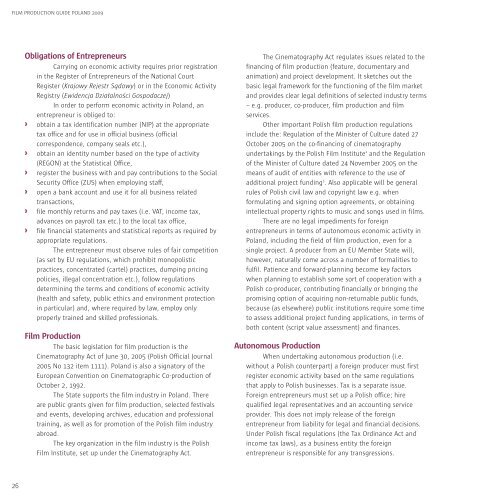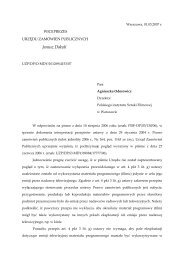Create successful ePaper yourself
Turn your PDF publications into a flip-book with our unique Google optimized e-Paper software.
FILM PRODUCTION GUIDE POLAND <strong>2009</strong><br />
2<br />
obligations of entrepreneurs<br />
Carrying on economic activity requires prior registration<br />
in the Register of Entrepreneurs of the National Court<br />
Register (Krajowy Rejestr Sądowy) or in the Economic Activity<br />
Registry (Ewidencja Działalności Gospodaczej)<br />
In order to perform economic activity in <strong>Poland</strong>, an<br />
entrepreneur is obliged to:<br />
› obtain a tax identification number (NIP) at the appropriate<br />
tax office and for use in official business (official<br />
correspondence, company seals etc.),<br />
› obtain an identity number based on the type of activity<br />
(REGON) at the Statistical Office,<br />
› register the business with and pay contributions to the Social<br />
Security Office (ZUS) when employing staff,<br />
› open a bank account and use it for all business related<br />
transactions,<br />
› file monthly returns and pay taxes (i.e. VAT, income tax,<br />
advances on payroll tax etc.) to the local tax office,<br />
› file financial statements and statistical reports as required by<br />
appropriate regulations.<br />
The entrepreneur must observe rules of fair competition<br />
(as set by EU regulations, which prohibit monopolistic<br />
practices, concentrated (cartel) practices, dumping pricing<br />
policies, illegal concentration etc.), follow regulations<br />
determining the terms and conditions of economic activity<br />
(health and safety, public ethics and environment protection<br />
in particular) and, where required by law, employ only<br />
properly trained and skilled professionals.<br />
Film Production<br />
The basic legislation for film production is the<br />
Cinematography Act of June 30, 2005 (Polish Official Journal<br />
2005 No 132 item 1111). <strong>Poland</strong> is also a signatory of the<br />
European Convention on Cinematographic Co-production of<br />
October 2, 1992.<br />
The State supports the film industry in <strong>Poland</strong>. There<br />
are public grants given for film production, selected festivals<br />
and events, developing archives, education and professional<br />
training, as well as for promotion of the Polish film industry<br />
abroad.<br />
The key organization in the film industry is the Polish<br />
Film Institute, set up under the Cinematography Act.<br />
The Cinematography Act regulates issues related to the<br />
financing of film production (feature, documentary and<br />
animation) and project development. It sketches out the<br />
basic legal framework for the functioning of the film market<br />
and provides clear legal definitions of selected industry terms<br />
– e.g. producer, co-producer, film production and film<br />
services.<br />
Other important Polish film production regulations<br />
include the: Regulation of the Minister of Culture dated 27<br />
October 2005 on the co-financing of cinematography<br />
undertakings by the Polish Film Institute 2 and the Regulation<br />
of the Minister of Culture dated 24 November 2005 on the<br />
means of audit of entities with reference to the use of<br />
additional project funding 3 . Also applicable will be general<br />
rules of Polish civil law and copyright law e.g. when<br />
formulating and signing option agreements, or obtaining<br />
intellectual property rights to music and songs used in films.<br />
There are no legal impediments for foreign<br />
entrepreneurs in terms of autonomous economic activity in<br />
<strong>Poland</strong>, including the field of film production, even for a<br />
single project. A producer from an EU Member State will,<br />
however, naturally come across a number of formalities to<br />
fulfil. Patience and forward-planning become key factors<br />
when planning to establish some sort of cooperation with a<br />
Polish co-producer, contributing financially or bringing the<br />
promising option of acquiring non-returnable public funds,<br />
because (as elsewhere) public institutions require some time<br />
to assess additional project funding applications, in terms of<br />
both content (script value assessment) and finances.<br />
autonomous Production<br />
When undertaking autonomous production (i.e.<br />
without a Polish counterpart) a foreign producer must first<br />
register economic activity based on the same regulations<br />
that apply to Polish businesses. Tax is a separate issue.<br />
Foreign entrepreneurs must set up a Polish office; hire<br />
qualified legal representatives and an accounting service<br />
provider. This does not imply release of the foreign<br />
entrepreneur from liability for legal and financial decisions.<br />
Under Polish fiscal regulations (the Tax Ordinance Act and<br />
income tax laws), as a business entity the foreign<br />
entrepreneur is responsible for any transgressions.








